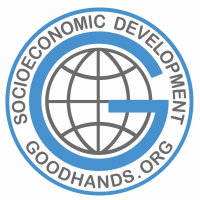Pedagogical collaboration with schools and initiatives
GoodHands digital lessons for learning a second language can be generated and used with numerous language combinations. In developing countries, the underprivileged population in slums and villages frequently speaks on only a regional dialect rather than the official national language, such as English.
The stages of understanding and speaking a second language are as follows.
Level 1 involves learning specific words with extra definitions in the native language.
Level 2 speed training for 1,350 words involves repeating three different words together.
Level 3 involves memorizing and repeating sentences in casual chat and informal discussion formats.
After the second language has been fully mastered, advanced lessons are provided covering reading, writing and mathematics. Practical skill information is also generated in the native language for the entire life enhancement of students who participate in digital learning.
Collaboration with partners might take place for a specific learning partition or for the entire curriculum, including future program expansions. Participating partners must be members of the GoodHands Community Coalition for Empowerment and Free Learning and support GoodHands public relations efforts.
Non-formal schools that teach English or another main language as a second language
International non-formal schools are known to assist children and young people in an unbureaucratic manner who, due to poverty, are unable to meet certain cost-related admission standards for public schools. Because non-formal schools do not get public support and funds, GoodHands digital learning offers some intriguing benefits.
Public schools that teach English or another main language as a second language
Collaboration, specifically for automated word training (level 2), can also be very beneficial for public schools. Digital learning and offline word practice are faster and more successful for student groups than traditional learning methods in schools.
Self-help initiatives and projects with persons in severe need of second language skills
Many small communities, villages, and minority around the world do not have schools. However, there are self-help groups and cooperatives that can greatly benefit from digital learning. It is useful to promote and sustainably support the work of such projects in a variety of ways.
Refugee camps whose people desperately need second language skills
In many nations, refugee camps lack school-like facilities and teachers. The shortage of instruction and supplies is severe. One solution is to organize digital learning for these impoverished people. Literate learning assistants with refugee status can effectively coordinate and supervise group lessons.
If you're interested in collaborating, please send an email to GoodHands

